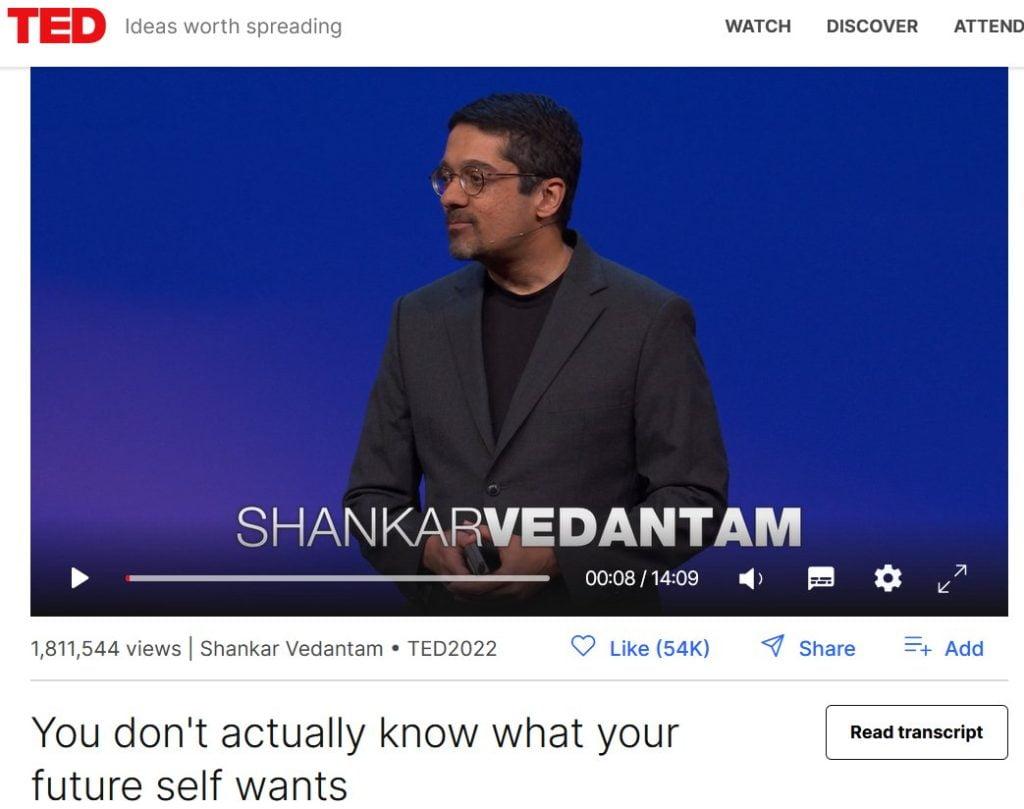
(info source: https://www.ted.com/talks/shankar_vedantam_you_don_t_actually_know_what_your_future_self_wants)
(image source: TED)
Impermanence. You might think it’s one of those 3 pillars of Buddhism in general, with “suffering” and “non-self” as the other two. It’s not merely religious but it’s the scientific reality as well. Nothing lasts forever. Everything is changing. Even our whole body, tissue by tissue and cell by cell, as science now knows, will not be the same 1 year after today. Softer, more psychological constructs like our values, visions, knowledge, opinions… cannot escape from the law, either.
But we are delusional believing it’ll be the same. It’s the beginning of the ending of a quality life. To let go of this age-old delusion of the “established, stable self” is the very key for our well-being in the 21st century, where rapid change and uncertainty are the daily norm . Mr. Vedantam explains it quite well just in 14 min. of this TED talk. It’s a bright talk with a lot of positivity (believe me, it’s NOT AT ALL negative).
Dr. Peter Ubel at Duke University is probably one of the best scholars who empirically illustrates the value in health by showing how patients’ and doctors’ self-image and values easily change over time. One of his studies shows patients diagnosed cancer were in despair not feeling like living any longer, especially when being told they’d have severe disabilities. However, they would be totally fine years later, wondering why they had been so pessimistic. They couldn’t predict how their own future-self would think and feel. They thought their life would be the end but it was not.
Do you think it’s a proof of humanity’s lacking cognitive abilities? No, it’s a proof of humanity’s “resilience,” man! As a matter of fact, Dr. Ubel wrote a good book titled “You’re Stronger Than You Think: Tapping into the Secrets of Emotionally Resilient People.” He also shows us the paradox of “Happily Hopeless” along this line of research. BTW, his scholarly work are damn important in reconsidering how we must carefully apply such measurement as QALY (quality-adjusted life year) and DALY (disability-adjusted life year) to evaluate health impact (such as this one or the other scholar’s work such as this inspired by his).
Coming back to Mr. Vedantam’s TED talk, he summarized 3 takeaways to get the best out of our changing future-self: 1) stay being curious; 2) practicing humility; 3) go being brave. And all those 3 factors are recommended by the current research of positive psychology. It’s not a big surprise at all.
たった14分間でヴェダンタムさん、非常に上手に話しています。仏教でいうところの「諸行無常」は、我々の身体的な細胞の置換に関しては逃がれようのない事実なので、より心理学的な価値、ヴィジョン、人生の目的などに関しては、ますますその通りです。全てのものは変化するし、永遠不滅のものなど何もない。(…という考え方すら不滅ではない…という考え方すら…とrecurseを続けます。)
私の元来の専門である意思決定科学においても、いかに我々が未来の自分に対して推測することが苦手か(それはもう、冗談みたいに!)ということが繰り返し実証されています。つまり、今の自分の価値観をもとに未来の計画を決めすぎたり、目標を決めすぎたりすると、大失敗する可能性があるということです。過去の計画に固執してたとえ成功したとしても、満足度が低くなる場合が多い。
医療における意思決定研究で世界的に著名なPeter Ubel博士は、いかに診断時に患者が描く未来の自己像が、数年も経過しない間に大きく変化し別人のようになるかを実証的に示してきました。たいていは過去の自分の悲観的に過ぎる判断を後悔し、驚く場合が多い。それは、人類の認知バイアスの愚かさを嘆く材料ではなく、むしろ、我々がいかに「レジリエンス」足り得るかの証左でもあります(実際、博士は一般向けに良書も書いてます: “You’re Stronger Than You Think: Tapping into the Secrets of Emotionally Resilient People.” )。
TEDトークの演者ヴェダンタム氏は、最後に3つのポイントを示し、効果的に「諸行無常な自己」をpositiveに生きるコツを教えています:1)常にopenmindであれ(執着せず学び続ける);2)常に謙虚であれ(今日の真実は明日の嘘);3)だからこそ、勇敢であれ(未来の世界も自分も大きく変わるので、諦めるな)。肩の力を抜いて、好奇心と謙虚さと共に、取り敢えずは今のビジョンに直結した方向性をしっかり作るということでしょうね。そうすれば、自分が思っていたのと違う結果が出ても、いや、むしろその方が、未来の自分にとっては満足度が高いことが多いかも知れません。